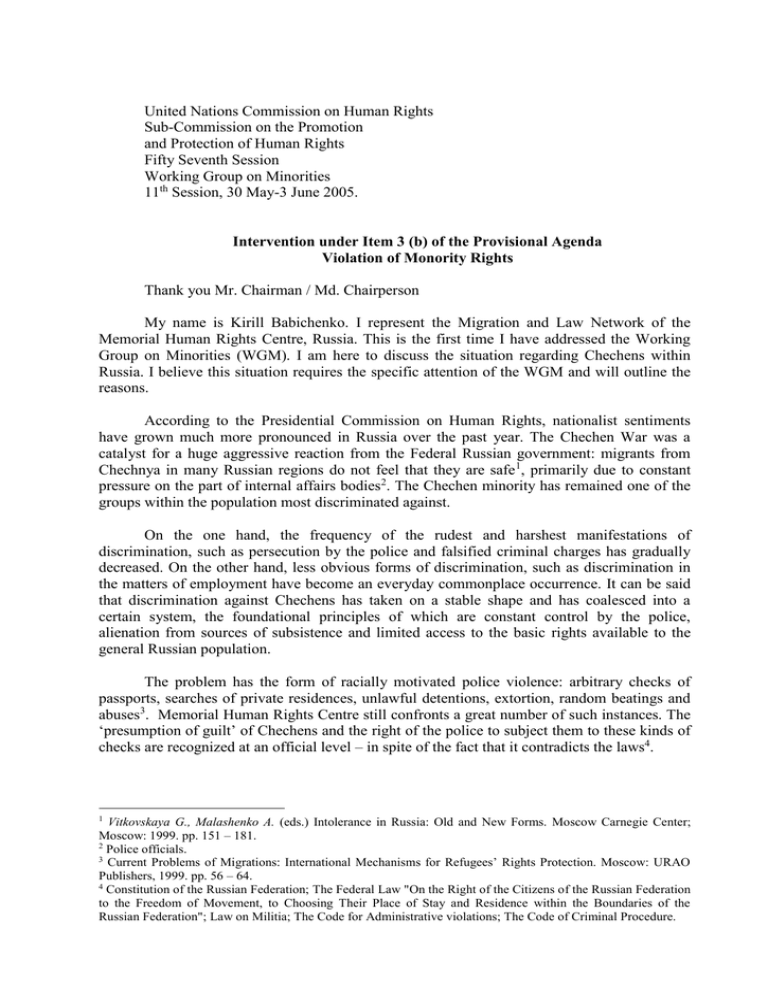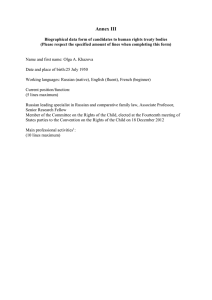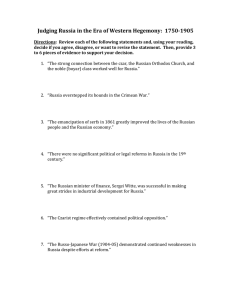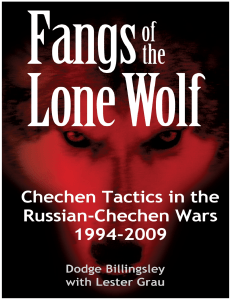United Nations Commission on Human Rights Sub-Commission on the Promotion
advertisement

United Nations Commission on Human Rights Sub-Commission on the Promotion and Protection of Human Rights Fifty Seventh Session Working Group on Minorities 11th Session, 30 May-3 June 2005. Intervention under Item 3 (b) of the Provisional Agenda Violation of Monority Rights Thank you Mr. Chairman / Md. Chairperson My name is Kirill Babichenko. I represent the Migration and Law Network of the Memorial Human Rights Centre, Russia. This is the first time I have addressed the Working Group on Minorities (WGM). I am here to discuss the situation regarding Chechens within Russia. I believe this situation requires the specific attention of the WGM and will outline the reasons. According to the Presidential Commission on Human Rights, nationalist sentiments have grown much more pronounced in Russia over the past year. The Chechen War was a catalyst for a huge aggressive reaction from the Federal Russian government: migrants from Chechnya in many Russian regions do not feel that they are safe 1, primarily due to constant pressure on the part of internal affairs bodies2. The Chechen minority has remained one of the groups within the population most discriminated against. On the one hand, the frequency of the rudest and harshest manifestations of discrimination, such as persecution by the police and falsified criminal charges has gradually decreased. On the other hand, less obvious forms of discrimination, such as discrimination in the matters of employment have become an everyday commonplace occurrence. It can be said that discrimination against Chechens has taken on a stable shape and has coalesced into a certain system, the foundational principles of which are constant control by the police, alienation from sources of subsistence and limited access to the basic rights available to the general Russian population. The problem has the form of racially motivated police violence: arbitrary checks of passports, searches of private residences, unlawful detentions, extortion, random beatings and abuses3. Memorial Human Rights Centre still confronts a great number of such instances. The ‘presumption of guilt’ of Chechens and the right of the police to subject them to these kinds of checks are recognized at an official level – in spite of the fact that it contradicts the laws4. 1 Vitkovskaya G., Malashenko A. (eds.) Intolerance in Russia: Old and New Forms. Moscow Carnegie Center; Moscow: 1999. pp. 151 – 181. 2 Police officials. 3 Current Problems of Migrations: International Mechanisms for Refugees’ Rights Protection. Moscow: URAO Publishers, 1999. pp. 56 – 64. 4 Constitution of the Russian Federation; The Federal Law "On the Right of the Citizens of the Russian Federation to the Freedom of Movement, to Choosing Their Place of Stay and Residence within the Boundaries of the Russian Federation"; Law on Militia; The Code for Administrative violations; The Code of Criminal Procedure. For example, on 22nd of November, Moscow policemen detained in the street Adam Ustarkhanov and brought him to the police department5. After several hours, brutally beaten Adam was found in a wasteland not far from that department with a serious craniocerebral injury and with the traces of handcuffs on his wrists6. The deputy of the parliament V.V. Igrunov sent a telegram to the General’s Prosecutors Office with a request to take the investigation for this case under control7. As a result of that correspondence, on the 26th of December, investigatory bodies closed the case8. In this regard it must be noted that the denial of rights to Chechens has violated Article 9 of International Covenant on Civil and Political Rights, which demands the State must provide equality before the law. The problems of xenophobia, police violence, and hate-crimes exist in many countries. They are unlikely to be easily resolved. The situation in Russia differs to a certain degree from that in other countries of the Commonwealth of Independent States, and Eastern Europe first, by its scale and acuteness, second, by the fact that there is some ground for political solutions9. In this respect any pressure made by United Nations Organisation would be very useful. Memorial Human Rights Centre urges and recommends the following: 1. That the special Rapporteur on racism examines the Federal Russian government’s practice of racial profiling of the Chechen minority during their visit in June 2005. 2. That Russia agrees to the requested visit of the special Rapporteur on torture who specifically wishes to look into the situation of Chehcnya and to investigates the situation of Chechens in Russia. 3. Investigate the authenticity of the Federal Russian government’s directed pressure against the Chechen minority. Equality and justice frame the possibilities of freedom, and greater freedom becomes attainable only when people are united and believe, as Martin Luther King Jr., once argued, “injustice anywhere is a threat to justice everywhere”10. Thank You Migration and Law Network of the Memorial Human Rights Centre, Russian Federation, 127051, г. Moscow, Malyi Karetnyi per., 12. http://www.refugee.memo.ru k-babichenko@yandex.ru Gannushkina S.A. On the Situation of Chechnya Residents in the Russian Federation. June 2003 – May 2004. Moscow, 2004 6 Ibid. 7 Ibid. 8 Ibid. 9 Ossipov, Alexander Racism in Russia: a few comments (a paper distributed via MINELRES (Minority Electronic Resources) international discussion group on 18 – 20 May 1998). 10 Martin Luther King, Jr., Why We Can’t Wait. New York: Penguin, 1963. p. 77. 5







